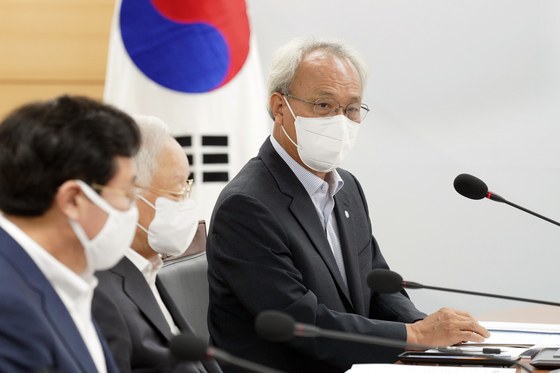![Sung-Hyun Moon, Chairman of Gyeong-No-wi. [중앙포토]](https://i0.wp.com/pds.joins.com/news/component/htmlphoto_mmdata/202102/23/eda2b36a-0db0-490f-ad20-8735130e0b12.jpg?w=560&ssl=1)
Sung-Hyun Moon, Chairman of Gyeong-No-wi. [중앙포토]
A labor-management agreement to introduce the labor director system in public institutions has passed through the Economic and Social Labor Committee (Gyeongsang Labor Committee), a social dialogue organization directly under the President.
Gyung-no-wi announced on the 23rd that the main committee held on the 19th deliberated and decided on six agendas, including the’Agreement for Sustainable Development of Public Institutions’. The meeting was held in writing to prevent the new coronavirus infection (Corona 19).
The labor director system is a system in which worker representatives enter the board of directors with voting rights and participate in management. It is being implemented in some countries, such as Germany, but in Korea, it was first introduced in 2016 when the city of Seoul enacted an ordinance that obligated 13 affiliated organizations with a capacity of 100 or more to introduce worker directors. The Moon Jae-in administration has also announced that it will introduce a labor director system to improve the governance structure of public institutions in the Five-Year Plan for State Administration.
The agreement with public institutions that came up on the agenda that day included not only the introduction of the labor director system, but also the reorganization of the wage system into a job-based salary system.
The agreement was finalized by meeting the quorum of decisions, but all four of the user committee members “disagree”. According to Gyung-no-Wee, “the introduction of the labor director system in public institutions can spread to private companies, and in confrontational labor-management relations, conflicts may intensify and social costs may be incurred.”
The labor-management agreement to improve the employee representative system, which clarified the office of workers representatives and the status of the election procedure, also passed the plenary session unanimously. In addition, agreements for maintaining the ecosystem of the tourism industry and stabilizing employment, and agreements for resolving blind spots in industrial accident insurance for delivery workers have crossed the threshold of the plenary session.
Chairman Kyung-Hyun Moon, “We have reached a historical agreement on the introduction of the labor director system and reorganization of the wage system in public institutions.” It is also meaningful in that the labor and management agreed unanimously.
The law enforcement agency plans to consult with the government and the National Assembly so that the resolution can be legislated.
Sejong = Reporter Kim Namjun [email protected]
